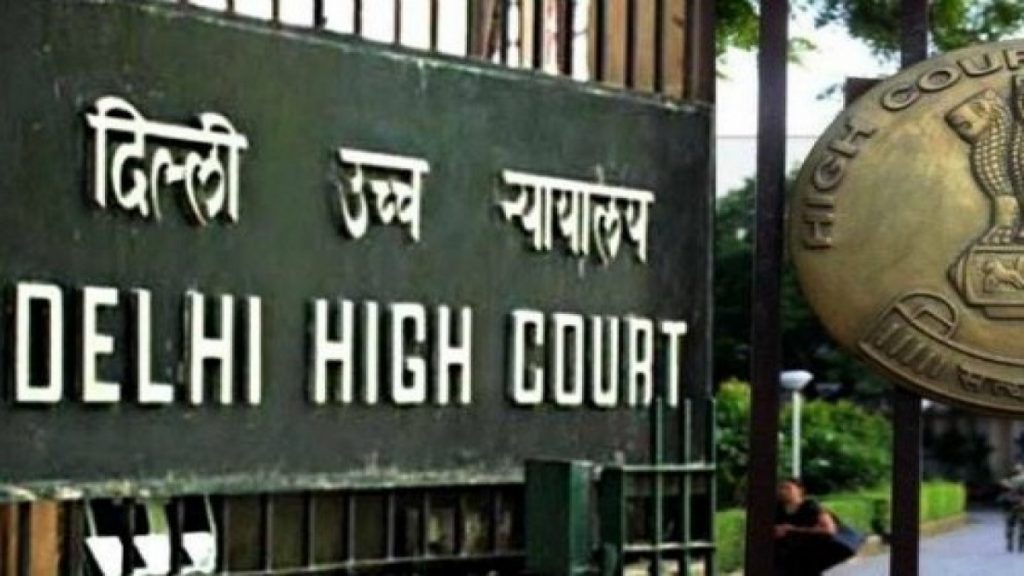New Delhi: Default bail is a fundamental right which flows from Article 21 of the Constitution and cannot be suspended even during Covid-19 pandemic, the Delhi High Court has said while granting bail to a dowry death accused. The Delhi High Court made its observations in the Abhishek vs State case. Justice Manoj Kumar Ohri also observed October 18 that the order of remanding an undertrial or extending such remand is a judicial function which requires due application of mind.
“It has been held to be an indefeasible part of the right to personal liberty under Article 21 of the Constitution of India, and such a right cannot be suspended even during a pandemic situation,” the high court said.
The court, therefore, issued a slew of directions so that the rights of undertrial prisoners to seek default bail are not defeated and custody of an undertrial is not extended mechanically as in the present case.
The accused man’s plea before the Delhi High Court was against an order of a Sessions Judge who had upheld a Magistrate’s order dismissing his plea for default bail. The accused and his family members were booked under Sections 304B (dowry death) 498A (husband or relative of husband of a woman subjecting her to cruelty), 406 (criminal breach of trust), 34 (common intention) of the Indian Penal Code on January 16, 2020.
It also came on record that the petitioner, following his arrest January 18, 2020, was first produced before a Magistrate Court on the next day, when he was remanded to custody.
As one of the offences he was booked under pertained to dowry death, which is punishable with imprisonment for a period exceeding 10 years or with life imprisonment, or death, the maximum period of his judicial custody was 90 days.
The custody period was stated to have ended on April 18, 2020. However, in between, when the petitioner was produced before the Jail Visiting Magistrate on April 15, 2020, the Magistrate concerned ‘without any application of mind and rather unmindful’ of the fact that 90 days would expire on April 18, 2020, was stated to have ‘mechanically’ extended the petitioner’s judicial custody till April 29, 2020.
The revision petition against the same was dismissed by the Additional Sessions Judge following which the present petition was filed before the High Court under Section 482 of Code of Criminal Procedure.
The petitioner’s counsel highlighted the non-filing of the chargesheet by the prosecution till April 18, 2020 and stated that right of default bail was in his client’s favour. The Delhi High Court noted that owing to the situation prevailing in India on account of the lockdown due to Covid-19 when physical filing of the bail application was not possible, an application was filed on behalf of the petitioner through an email sent April 20, 2020 at around 1.16pm at the email address provided to the counsel.
The e-mail, according to records, had not only prayed for release on default bail but also communicated the acceptability of condition requiring filing of bail bonds. It was also submitted that the mail mentioned the provision of Section 167(2) of Code of Criminal Procedure (CrPC) under which the default bail was sought as well as the details of the case.
“Nothing more was required to be done by the petitioner. The listing of such an application was not in his hand. Sending an email on behalf of the petitioner, in the opinion of this Court, amounted to availing of his right to seek default bail. The contention raised on behalf of the State that the application never came to be listed or was abandoned by the petitioner, being meritless, is rejected,” the High Court observed.
The charge sheet in the case was observed to have been filed physically before the duty Magistrate as reflected from an order dated April 20, 2020 available in the trial court record.
“It is pertinent to note that the charge sheet having been filed before a duty Magistrate, no cognisance was taken on that date,” the court added.
After examining a status report filed in reply to the man’s petition, the Court said it was incumbent on the State to positively state the time when charge sheet came to be filed before the Court on April 20, 2020, i.e., whether it was prior to the filing of the application for default bail or later.
The Court underscored that the answer to the above question was of paramount importance in view of the relevant laws, but it remained unanswered. Therefore, it was held that it couldn’t be concluded that at the time of petitioner availing his right to seek default bail, the charge sheet was already filed.
The Delhi High Court also directed that the judgment be forwarded to all District and Sessions Judges to ensure strict compliance with the directions passed. The registry was also directed to bring the judgment to the notice of the Registrar General and transmit a copy of the same to the DG (Prisons) as well as to the Member Secretary, Delhi State Legal Services Authority.
Advocate Rajesh Anand represented the petitioner while Additional Public Prosecutor appeared for the State.
